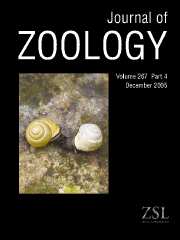Crossref Citations
This article has been cited by the following publications. This list is generated based on data provided by
Crossref.
Williams, Jason D
and
McDermott, John J
2004.
Hermit crab biocoenoses: a worldwide review of the diversity and natural history of hermit crab associates.
Journal of Experimental Marine Biology and Ecology,
Vol. 305,
Issue. 1,
p.
1.
Casadio, Silvio
Parras, Ana
Griffin, Miguel
and
Marenssi, Sergio
2007.
Borers and encrusters as indicators of the presence of hermit crabs in Antarctic Eocene gastropods shells.
Antarctic Science,
Vol. 19,
Issue. 3,
p.
297.
Chainho, Paula
Lane, M. F.
Chaves, M. L.
Costa, J. L.
Costa, M. J.
and
Dauer, D. M.
2007.
Taxonomic sufficiency as a useful tool for typology in a poikilohaline estuary.
Hydrobiologia,
Vol. 587,
Issue. 1,
p.
63.
Ishikawa, Makiko
and
Kase, Tomoki
2007.
Spionid bore holePolydorichnus subapicalisnew ichnogenus and ichnospecies: a new behavioral trace in gastropod shells.
Journal of Paleontology,
Vol. 81,
Issue. 6,
p.
1466.
Torati, Lucas S.
and
Mantelatto, Fernando L.
2008.
Uncommon mechanism of egg incubation in the endemic Southern hermit crab Loxopagurus loxochelis: how is this phenomenon related to egg production?.
Acta Zoologica,
Vol. 89,
Issue. 1,
p.
79.
Dvoretsky, Alexander G.
and
Dvoretsky, Vladimir G.
2009.
Distribution of amphipods Ischyrocerus on the red king crab, Paralithodes camtschaticus: Possible interactions with the host in the Barents Sea.
Estuarine, Coastal and Shelf Science,
Vol. 82,
Issue. 3,
p.
390.
Dvoretsky, Alexander G.
and
Dvoretsky, Vladimir G.
2010.
Epifauna associated with an introduced crab in the Barents Sea: a 5-year study.
ICES Journal of Marine Science,
Vol. 67,
Issue. 2,
p.
204.
Dvoretsky, Alexander G.
and
Dvoretsky, Vladimir G.
2010.
The amphipod Ischyrocerus commensalis on the eggs of the red king crab Paralithodes camtschaticus: Egg predator or scavenger?.
Aquaculture,
Vol. 298,
Issue. 3-4,
p.
185.
WILLIAMS, Jason D.
GALLARDO, Alejandra
and
MURPHY, Angela E.
2011.
Crustacean parasites associated with hermit crabs from the western Mediterranean Sea, with first documentation of egg predation by the burrowing barnacle Trypetesa lampas (Cirripedia: Acrothoracica: Trypetesidae).
Integrative Zoology,
Vol. 6,
Issue. 1,
p.
13.
Dvoretsky, A. G.
and
Dvoretsky, V. G.
2012.
New data on the symbiosis of Ischyrocerus amphipods colonizing the eggs of the host species, red king crab.
Doklady Biological Sciences,
Vol. 445,
Issue. 1,
p.
255.
Murphy, Angela E.
and
Williams, Jason D.
2013.
New records of two trypetesid burrowing barnacles (Crustacea: Cirripedia: Acrothoracica: Trypetesidae) and their predation on host hermit crab eggs.
Journal of the Marine Biological Association of the United Kingdom,
Vol. 93,
Issue. 1,
p.
107.
Dvoretsky, Alexander
and
Dvoretsky, Vladimir
2014.
King Crabs of the World.
p.
501.
Baldrighi, E.
Vanreusel, A.
Zeppilli, D.
Sandulli, R.
and
Segonzac, M.
2018.
Occurrence ofChromadorita regabisp. nov. (Nematoda: Adenophorea), a nematode egg predator ofAlvinocaris muricola(Crustacea: Decapoda: Caridea: Alvinocarididae) from a deep cold seep area of the Gulf of Guinea.
The European Zoological Journal,
Vol. 85,
Issue. 1,
p.
299.
Mills, Kimberley
and
Mortimer, Kate
2019.
Observations on the tubicolous annelidMagelona alleni(Magelonidae), with discussions on the relationship between morphology and behaviour of European magelonids.
Journal of the Marine Biological Association of the United Kingdom,
Vol. 99,
Issue. 4,
p.
715.
Zhukova, Natalia V.
2023.
Fatty acid analysis reveals variations in the diet of shallow-water spionids (Annelida: Polychaeta: Spionidae).
Marine Biology,
Vol. 170,
Issue. 12,




